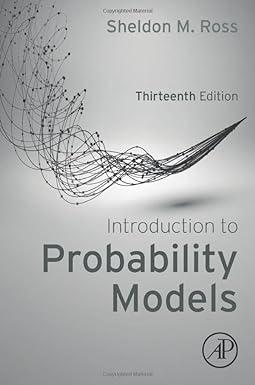A system of N machines operates as follows. Each machine works for an exponentially distributed time with
Question:
A system of N machines operates as follows. Each machine works for an exponentially distributed time with rate λ before failing. Upon failure, a machine must go through two phases of service. Phase 1 service lasts for an exponential time with rate μ, and there are always servers available for phase 1 service.
After competing phase 1 service the machine goes to a server that performs phase 2 service. If that server is busy then the machine joins the waiting queue.
The time it takes to complete a phase 2 service is exponential with rate v. After completing a phase 2 service the machine goes back to work. Consider the continuous time Markov chain whose state at any time is the triplet of nonnegative numbers n = (n0,n1,n2) where n0 +n1 +n2 = N, with the interpretation that of the N machines, n0 are working, n1 are in phase 1 service, and n2 are in phase 2 service.
(a) Give the instantaneous transition rates of this continuous time Markov chain.
(b) Interpreting the reverse chain as a model of similar type, except that machines go from working to phase 2 and then to phase 1 service, conjecture the transition rates of the reverse chain. In doing so, make sure that your conjecture would result in the rate at which the reverse chain departs state
(n, k, j) upon a visit being equal to the rate at which the forward chain departs that state upon a visit.
(c) Prove that your conjecture is correct and find the limiting probabilities.
Step by Step Answer:







